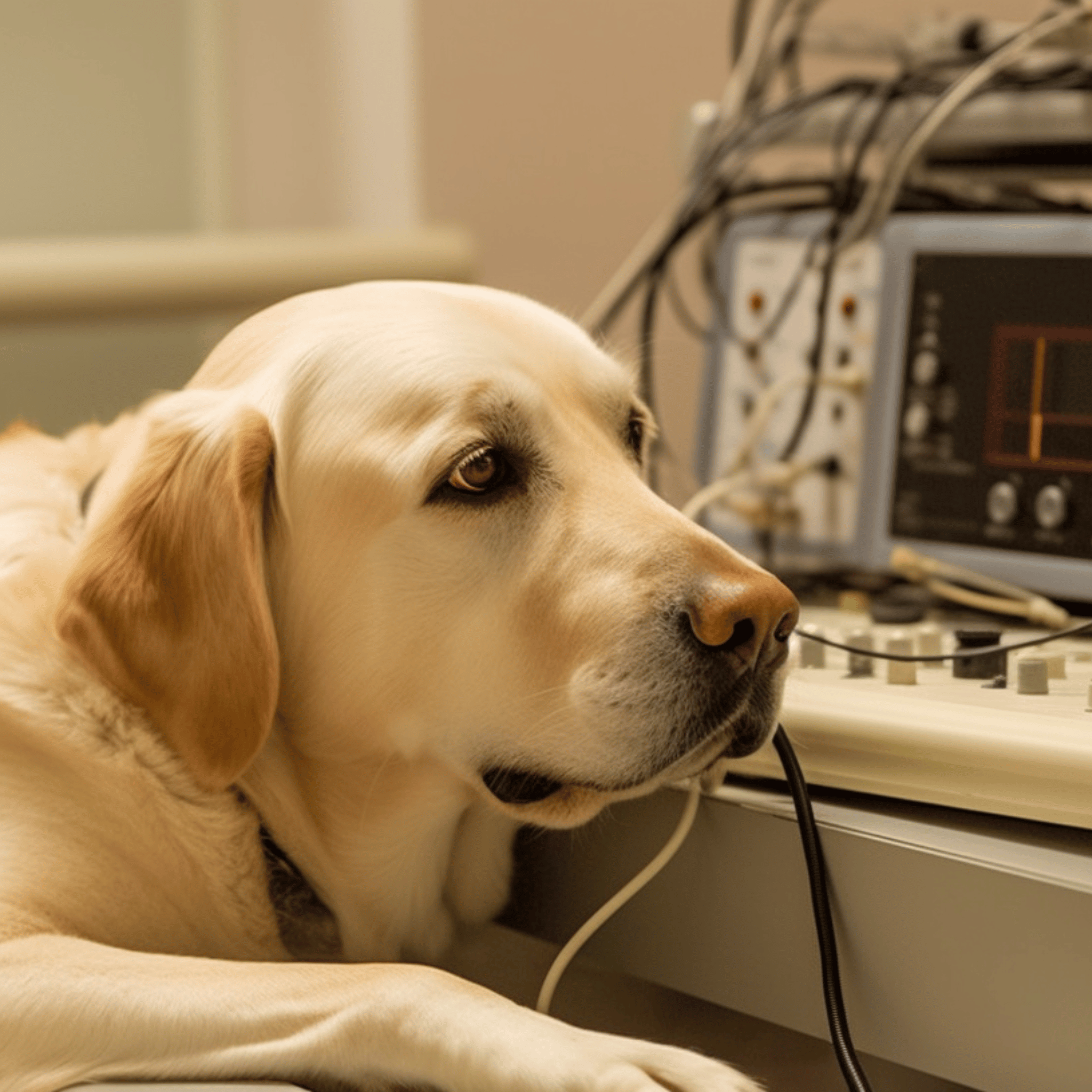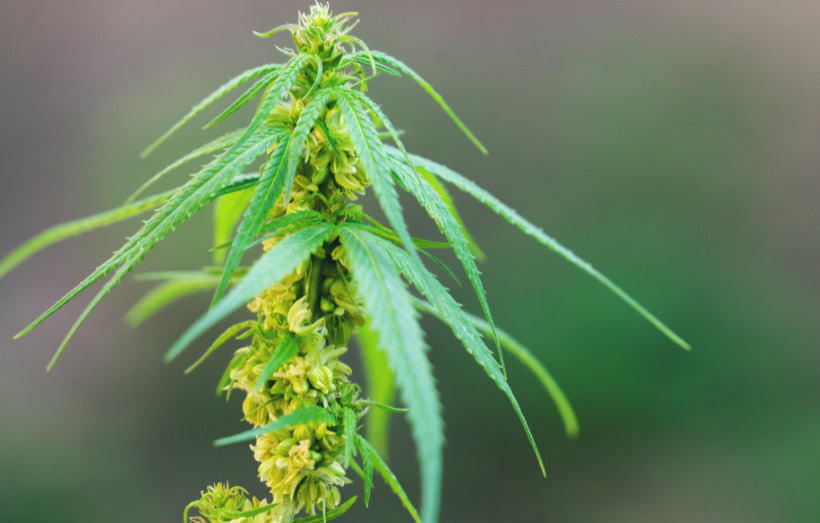For dog owners, there’s nothing more harrowing than witnessing their furry friend in the throes of a seizure. Yes, CBD has shown potential in reducing the frequency of seizures in some dogs with epilepsy, as evidenced by various studies and veterinary experiences better understand the potential of CBD in treating such conditions, it’s essential first to grasp what epilepsy in dogs entails.
What Exactly is Epilepsy?
Think of epilepsy as an electrical storm in a dog’s brain. Just like how our gadgets glitch when there’s a sudden surge of power, a dog’s brain can sometimes have bursts of unexpected electrical activity. This leads to what we know as seizures.

Why Does This Happen?
The brain is like a super-complex computer. It sends signals all over the body to make it do things, from wagging a tail to jumping for joy. Sometimes, these signals go haywire, causing a sort of ‘short circuit.’
This disruption is what causes the physical signs of a seizure. Imagine you’re watching a movie, and suddenly the screen starts flickering. It’s somewhat similar, but in dogs, this ‘flickering’ can manifest in various ways.
How Do Seizures Look?
Seizures in dogs can range from almost invisible to quite dramatic:
- Mild Signs: Your dog might seem ‘zoned out’ for a few seconds, maybe staring at a spot or having unusual rapid eye movements. It might look like they’re daydreaming, but this could be a mild form of a seizure.
- Moderate Symptoms: They may show twitches in parts of their body or seem disoriented. Some dogs might exhibit repetitive behaviors, like chewing or lip-smacking.
- Severe Episodes: This is what most people picture when they think of a seizure. Your dog could fall to the side, have jerking movements, salivate excessively, or even become unconscious.
Epilepsy can be a long-term condition, but that doesn’t mean seizures happen all the time. Dogs with epilepsy can have long periods where they’re just like any other dog, interspersed with these episodes of abnormal brain activity.
Epilepsy might sound scary, but with the right care and understanding, many dogs with this condition can lead happy, fulfilling lives. It’s essential to recognize the signs early and consult a vet for proper diagnosis and treatment.
CBD’s Potential in Treating Dog Seizures

In the quest to understand and alleviate health challenges in our canine companions, modern science is increasingly turning to nature for solutions. One of the most discussed natural compounds in recent years is CBD, or Cannabidiol, derived from the cannabis plant. It’s gaining attention for its potential therapeutic properties, especially concerning neurological disorders.
The Endocannabinoid System Connection:
The endocannabinoid system (ECS) is an intricate network of receptors present throughout the bodies of all mammals, including our canine companions. This system plays a pivotal role in regulating various physiological processes, from mood and appetite to pain perception and, crucially for this topic, neural activity.
The ECS consists of two main receptors: CB1 and CB2. CB1 receptors are mainly situated in the brain and the central nervous system. This is the realm where CBD exerts its effect. As dogs consume CBD, it primarily binds with these CB1 receptors. By engaging with these receptors, CBD seeks to restore equilibrium to a brain affected by epilepsy, potentially diminishing the frequency of seizures.
Research Insights:
Emerging research is increasingly showcasing the possible benefits of CBD in managing and reducing seizures in dogs. One of the most notable studies was conducted by Colorado State University. Their research discovered that an astounding 89 percent of dogs that were administered CBD experienced a reduction in the frequency of their seizures. Such a statistic is a compelling indicator of CBD’s potential therapeutic benefits for dogs with epilepsy.
Furthermore, the National Institute of Health (NIH) has added to this body of research by conducting studies on rodents. Their findings have further cemented the anticonvulsant properties of CBD. While rodents are not dogs, the presence of similar endocannabinoid systems across mammals makes these results particularly relevant and promising for our pets.
The combination of empirical studies and real-world testimonials presents a strong case for the potential of CBD as an alternative or supplementary treatment for dogs experiencing seizures. As always, ongoing studies and clinical trials will further shed light on this intriguing area of veterinary health.

How to Give CBD to Dogs
Determining the Right Dosage: Just as with any supplement or medication, finding the right dosage of CBD for your dog is crucial. Because dogs vary in size, age, and health condition, there’s no one-size-fits-all dosage. Start with the lowest recommended amount on the product label or as advised by your vet. Monitor your dog closely for any changes or reactions.
If no adverse effects are observed, and if you feel the desired effects aren’t achieved, you can gradually increase the dosage. Remember, consulting with a veterinarian experienced in CBD use can provide personalized guidance tailored to your dog’s needs.
Consistency is Key – Frequency Matters: To achieve the desired therapeutic effects, maintaining a consistent regimen is essential. Most pet owners find administering CBD once or twice daily to be most effective, but this can vary depending on the dog’s specific condition and the CBD product’s potency. Keep a schedule, observe your dog’s reactions, and adjust the frequency if necessary.
Choosing the Right Administration Method: CBD for pets is available in a myriad of forms, ensuring there’s something for every furry friend. Here are some options:
- CBD Oils/Tinctures: These can be given directly via the mouth using a dropper or mixed in with food. They often provide the most immediate effects since they’re quickly absorbed.
- CBD-infused Treats/Biscuits: Ideal for dogs who might be fussy or apprehensive. They are not only tasty but also mask the distinct taste of CBD, ensuring your dog gets its benefits without a fuss.
- Topicals/Ointments: Best for dogs suffering from localized pain, like joint issues. These are applied directly to the skin and can provide targeted relief.
- CBD Capsules: These are an alternative for those who prefer a no-mess, precise dosage. They can be hidden in treats or food.
Always consider the specific needs and preferences of your dog. Some might love the taste of CBD oil, while others might turn their noses up and prefer a biscuit. Your goal is to make the experience as stress-free and beneficial as possible for both you and your pet.

Key Takeaways
- Prioritize Quality: Opt for high-quality, lab-tested CBD products. This ensures the efficacy and safety of the product for your pet.
- Watch for Side Effects: Generally deemed safe, CBD might, in some rare instances, lead to side effects such as appetite changes or mild diarrhea. Monitor your pet closely after introducing any new supplement.

Conclusion
In navigating the path to optimal pet health, the potential of CBD emerges as a beacon of hope, especially for those with seizure-prone canine companions. While the benefits of this holistic approach are promising, it’s crucial to prioritize due diligence: always choose quality, organic, and transparent CBD brands.
Stay informed with the latest scientific advancements and consider joining pet wellness communities for shared experiences and support. Embracing CBD for your dog symbolizes a commitment to nature’s remedies, underpinned by a profound desire to enhance their well-being.
FAQs
How can I stop my dog from having seizures naturally?
To naturally mitigate seizures in dogs, integrate essential fatty acids like fish or flaxseed oil into their diet, ensure they consume a balanced and allergen-free meal, and explore options like lavender oil, acupressure, and melatonin. For seizures due to low blood sugar, honey can be beneficial.
How do you use CBD for dogs?
You can administer CBD oil by mixing it directly with your dog’s food, whether it’s hard kibble or soft food. Ensure the CBD is evenly distributed throughout the food for consistent dosage.
Are dogs in pain during seizures?
While it may appear distressing, dogs are generally not aware of pain during a seizure. Due to the intense brain activity and the altered state of consciousness during a seizure, they do not perceive pain in the way they might during full consciousness.
What vitamins can support dogs with epilepsy?
In addition to conventional treatments, some pet owners use supplements like B Complex vitamins and milk thistle to support their epileptic dogs. However, always consult with a veterinarian before introducing any new supplements to your dog’s regimen.
Can seizures cause permanent damage to a dog’s brain?
Status epilepticus, a prolonged seizure lasting more than five minutes, is particularly concerning. If not promptly treated with anticonvulsants, it might lead to irreversible brain damage or even be fatal. Immediate veterinary attention is crucial in such cases.




































